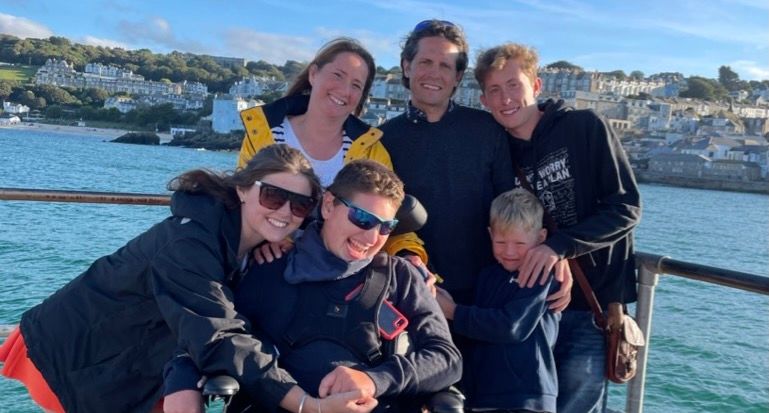
Rachel Wright on systemic mistrust and “sorry”
by Melanie Dimmitt
Mar 11, 2024
She wears a lot of caps – and she’s not afraid to speak out from under them. We get deep into institutionalised bias in the health sector and societal attitudes toward disability with the founder of Born At The Right Time.
The work of this woman is, in a word, prolific. A nurse by trade, since the first of her three children, her now 18-year-old son, entered the world with severe and complex brain damage, Rachel Wright has become the ultimate slashie.
Starting what was then a blog, Born At The Right Time, in 2014, Rachel went on to author her family’s memoir, The Skies I’m Under, and co-author a second book, Shattered, with her husband Tim. She’s now into her third season of hosting The Skies We’re Under Podcast – and has built Born At The Right Time into a change-making mecca for caregivers.
As well as supporting families, Rachel delivers courses for health professionals across historically neglected areas such as recognising lived experience and how to work collaboratively with parent carers. Her community is also getting in the ears of policy makers and service providers, by way of research-backed initiatives and lobbying.
The need for this education came from Rachel’s own experience as a nurse and parent carer – and the vastly different way she found she was being treated, as the latter, by the health and disability sectors.
“I learned to surreptitiously put enough medical jargon in what I was saying so that they knew they couldn’t bullshit me, but there’s absolutely a different tone and stance – and it really is around trust,” says the Southend-On-Sea local. “There’s an undercurrent of mistrust.”
Read on as Rachel chats with me, a fellow parent carer of a son with profound disability, on this and some of the other spicier issues our families contend with.
Let’s unpack this idea of mistrust between parent carers and the health and disability service spaces, which a lot of your work seeks to remedy. What does this mistrust look like?
Think about how, when you try to access services or support for your child, you have to be scrutinised. That’s inherent in our system. We can’t just say what we need, we have to prove it. We have to jump through the hoops and we usually have to be on our knees before we get it.
The system will say that it wants to work collaboratively with the parents and carers – it wants us to be part of “the team” – but we are not treated as part of the team.
There’s this imbalance, because we are expected to offer and honour the professionals working within the system with an absolute level of trust. If we start saying they haven’t done what they said they would do, we’re seen as a “difficult” or “challenging” parent. “Why can’t they just let us get on with our job, you know? Because we’re all doing our very best.”
But it’s not the practitioners’ fault that, inherently, the system doesn’t offer that trust to parent carers. It’s under the cloak and dagger of attitudes like, “We’ve got to be good stewards of our public funds and we’ve got to make sure that we’re spending wisely”.
Fundamentally, we are given the same respect and diligence as someone who’s in prison. It’s like being on probation.
I’m chatting to you from Australia, where a lot of families feel they have to fight tooth and nail to get supports through our National Disability Insurance Scheme (NDIS).
It can look like an abusive relationship, can’t it? There’s coercion, there’s gaslighting, there’s financial control, there’s emotional manipulation. You hear things like, “If you get this money, then someone else won’t get it – and other people are worse off than you”. Or, “If you ask for another reassessment, we might actually reduce your funds.”
In any other relationship that looked like this, you’d be like, get out! But this is our only system and there’s awareness growing around the trauma that parent carers experience within it. Evidence is strongly showing that this trauma isn’t caused by a child’s disability or condition. It’s caused by the way in which we are required to navigate, and are treated by, the system and services.
Practitioners are also suffering from the trauma of working within a system that doesn't enable them to do their job properly. Some of the courses we deliver through Born At The Right Time include this evidence of trauma, on both the parent carer and practitioner sides, and how it contributes to this hotbed of conflict and challenge.
The educating you’re doing is so key to making the system work better. How are you working to build trust between families and health professionals?
There are little things that have a big impact – like our Don’t Call Me Mum initiative, which is aimed at bridging the gap between professionals and parents. This is founded on mutual respect and simply asks practitioners to use the parent’s name. Like, unless you’ve come out of my body, only call me by my name, not “mum” or “dad”.
We’ve also brought together a group of women who are all parent carers – or have been, some of them are bereaved – and also experts in their own field. Our think tank, ComplexUs, has come out of this group and we’re trying to do policymaking from the inside out. So rather than, let’s start with a system and see how we can bring in the views of parent carers, how about we start with lived experience, alongside the knowledge of the system and how it works?
We acknowledge that the system needs to be economically viable. It can’t be that everyone gets everything they need on a silver platter and everyone else pays for it. You’ve got to be realistic, but the way things are done now is inefficient, particularly for the 0.1 percent of people the system is supporting, who have severe learning disabilities and physical complexities, as well.
If we can make the system work for children like ours – those in that 0.1 percent – it will work for everyone.
Like your son, my son is also in that 0.1 percent. He’s non-speaking and, as such, we are often required to advocate on his behalf. You talked in one of your The Skies We’re Under Podcast episodes about the tension that exists around parents “speaking for” their disabled children. How are you feeling about this now?
Because of the complexity of his learning difficulties, my son is never going to have a voice. I’m kind of coming around to maybe telling more of his story online, because if I don’t tell his story, how is his life ever going to be part of the discussion?
The disabled community can’t represent his voice, because if someone with a disability has a voice, then they’re not at all like him. If they have agency, if they have the cognition to be able to understand stuff and to articulate themselves, a disabled person’s experience is so far removed from someone like my son, I don’t think it’s on the same plane. And this is why I feel like their stories ought to be more connected to and communicated by the people who care for them.
However, I also recognise that we all go through an emotional – I hate this word – “journey”. And is it right for the language – how we describe and perceive our child’s disability – to be dependent on our own emotional range?
I don’t know anybody who didn’t sit in a doctor’s office, get given their child’s diagnosis, and crumble. I don’t know anyone who was like, “Oh, that’s so good. That’s what I’ve always wanted. Thank you so much!” We all have varying speeds of coming around – of seeing it differently.
Absolutely – and the negative attitude society largely takes to disability doesn’t help with speeding up this process. As someone now 18 years into this “journey”, how do you feel when people pity your family? How do you respond when you hear those, “I’m sorrys”?
When a stranger says “sorry”, they’re just where we were at in that doctor’s office. We can’t expect them to have all the stuff that we’ve accrued in the last however-many years. But we don't necessarily give people grace, we just expect everyone to be where we are.
How I respond to “I’m sorry” depends on the situation. If I have zero interest in engaging in a conversation, I’m like, okay, I don’t need to change their mind. Other times I’ll say, “There’s no need to be sorry. You didn't do anything.” Sometimes, if someone comes to do something in the house and my son’s lying in bed watching something and laughing his head off, I'll be like, “He doesn’t look like you need to be sorry for him!” But it just depends.
More often than not, if it’s a passing comment, I’m less interested in being responsible for strangers' opinions.
I’m also losing energy for it, but for a long time I’d always respond to “I’m sorry” with a full song and dance routine – don't be sorry! He's the happiest kid! It's all amazing!
I used to do that, too. I couldn’t give the honest answer, so I ended up doing this pendulum swing of the extreme on the other side – which was just as toxic, actually. “All disabled people are all a joy! They're all a delight! Aren't they such a blessing!” and so on.
I still don’t think I’ve found a way of landing in that healthy middle ground of: “Actually, it’s wonderful because life is wonderful, and it’s also hard and shit because, guess what? So’s life.”
I go to those extremes because, often, people approach from the negative. If we were approached in a neutral way, then it would be easier to just say it like it is.
A piece I wrote years ago around how to communicate with parent carers said, as you say, to start neutral. Connect with humanity and be neutral, because that lets the parent decide where they want to go. If you go either positive or negative, there’s this instinct to do the opposite and you don’t get the honesty. You don’t get the truth of the situation.
Season three of The Skies We’re Under Podcast is out now. Find this and other resources from Rachel and her team at Born at the Right Time – and follow along on Instagram.

